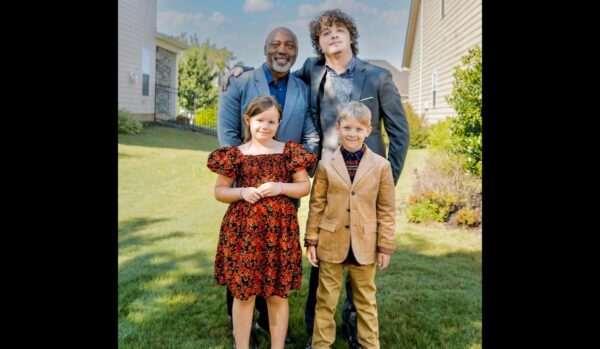A Black North Carolina man is the head of a unique family. A solo dad over the last six years, he has adopted four white children who needed a home.
Peter Mutabazi’s children are Anthony, 17; Isabella, 8; Luke, 7, and a toddler daughter, whose name has not been disclosed.

He finds being a father to these kids to be very important because he remembers what it was like to be a child on his own and how transformative it was to have someone step in and help in his time of need.
Trending Today:
- ‘I’ll Drag You Out of That Car!’: Enraged White Man with Unleashed Pitbull Threatens Delivery Woman In Viral Video Sparking Outrage
- Woman In Viral Cheesecake Factory Date Video Admits She Was ‘Self-Centered,’ But She Expects to be Treated Like ‘Royalty’ When a Man ‘Courts Her’
- New Jersey Man Who Was Caught on Video Spitting In Black Neighbor’s Face, Calling Him the N-Word Pleads Guilty to Hate Crime
When Mutabazi was a boy, he lived in an abusive home, which led him to run away and live on the streets in Kampala, Uganda. A stranger came into his life and changed everything. This included sponsoring his high-school education, which enabled him to get a college scholarship, a path that eventually led to him moving to the United States.
The 49-year-old said his love for his children transcends race and is one of the things that makes the unconventional family he has special.
“Sometimes it feels surreal,” he said in an interview with CNN. “I look at them, and I can’t believe that they are my kids. They have my last name. I can’t believe that this once homeless and hopeless person has now created this crazy family filled with love.”
The foster child story is, unfortunately, one with which many Americans are familiar.
Department of Health and Human Services statistics show that there were nearly 400,000 children in foster care in the United States during fiscal year 2021.
Before becoming an adopted father, Mutabazi served as a foster dad to approximately three dozen young children of all races and cultures. In the United States, he stands out as a rarity, as only around 3 percent of foster parents are single men, and the number of Black immigrant males serving as foster parents is even smaller.
Mutabazi shares his extraordinary family with the world on social media. His Instagram profile has over 328,000 followers. Still, not everyone can appreciate his mixed family; some have criticized him for not adopting any Black children still locked in the system.
“So he couldn’t find any Black kids?” one person asked on the X social media platform, while another asked in more detail, “Did he adopt and raise any black American children?”
The questions raised by the X users go beyond merely discussing the suitability of a Black man raising white children in Charlotte, North Carolina, where white people make up 44 percent of the population, and Black people make up 35 percent, according to the U.S. Census.
The comments highlight the profound disparities and challenges faced by Black children who enter the foster care system or are put up for adoption.
Never miss a story — sign up for ATLANTA BLACK STAR’S free daily newsletters to stay up-to-date on the latest developments, from top news headlines to celebrity news.
In 2021, the number of Black children in foster care hit its lowest point since the dawn of the millennium. Data showed Black children represented 14 percent of the total child population but 22 percent of all kids in foster care, a study from the Annie E. Casey Foundation discovered.
While the number is bleak, there has been an uptick in the securing of homes for Black children over the last two decades. The placement rate of children into homes has shown a consistent decline. In 2000, a whopping 39 percent of kids in the system were Black. That downward number stabilized at 23 percent in 2016 and further decreased by one percentage point in 2021.
Meanwhile, over the same time frame, the proportion of white children in foster care increased from 38 percent to 43 percent, and the percentage of Hispanic children also saw an increase, rising from 15 percent to 22 percent.


